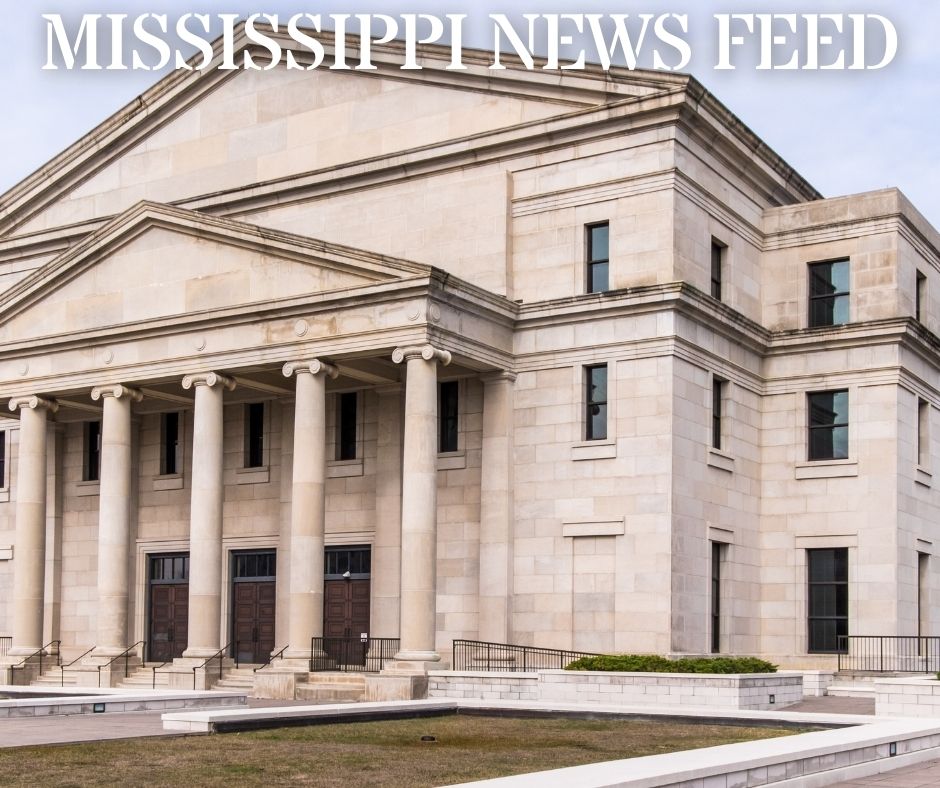Mississippi Today
He wrote Tate Reeves a $25,000 check. Three weeks later, Reeves appointed him to the Gaming Commission.

Gulfport Memorial Hospital CEO Kent Nicaud wrote Gov. Tate Reeves a $25,000 campaign check about three weeks before the governor appointed him to a significant government job.
Nicaud, who has long been among Reeves' top campaign donors, landed the governor's Gaming Commission appointment on March 8, 2023. A little more than three weeks before the appointment, on Feb. 13, 2023, Nicaud wrote Reeves' campaign the $25,000 check, according to a campaign finance report released last week.
Gaming commissioners receive a modest salary from taxpayers — $40 per day — and are reimbursed by the state for travel and meals. The commission is tasked with regulating the casino gaming industry, which brings the state hundreds of millions in tax revenue each year. That revenue has become necessary to fund basic public services across Mississippi, and because gaming commissioners wield great influence over changes to the industry, they are broadly considered critical figures to one of the state's most powerful and wealthiest lobbies.
The hospital executive is the latest Nicaud to receive a government appointment from Reeves. Kent's wife Jenny Field Nicaud, an attorney, scored a Reeves appointment in 2021 as an administrative law judge for the Mississippi Workers Compensation Commission. In that role, Jenny earns an annual salary of $120,768.98, according to Mississippi State Personnel Board records.
The couple's son Jourdan Nicaud, a well-known Gulf Coast restaurateur, is also a major campaign donor to Reeves. According to last week's finance report, Jourdan wrote Reeves a separate $25,000 check, which was dated about two weeks after his father was confirmed to the Gaming Commission by the Senate.
All told, the Nicaud family has given close to $200,000 in campaign donations to Reeves over the past few years, according to the governor's finance reports.
And they've facilitated even more donations to the Reeves camp. The couple hosted a fundraiser for Reeves at their Pass Christian mansion in late 2020, the same week that the state's top physicians issued dire warnings about a lack of hospital bed space to accommodate COVID-19 patients, and during a period Reeves signed mandates limiting the number of people allowed to gather in one place at a time. Kent Nicaud, whose Gulfport hospital had just five beds available on the day of the fundraiser, told Mississippi Today the guests were “very conscious of all the social distancing.”
“This was a very small group of people, and the reason it was at my home was because of the ability to keep everyone separate,” Nicaud said, pointing out that his house is 11,000 square feet. “There were probably never more than 21, 22 people there at one time. This was an event that I felt was meeting safety criteria, and the governor was already in town for a tourism commission and chamber of commerce. This was an opportunity for people to talk to (Reeves) about specific things. We did it safely.”
Nicaud did not return a request for comment on this story.
READ MORE: Kent Nicaud hosts in-person fundraiser for Gov. Tate Reeves during major COVID-19 spike
The Nicauds are among several Reeves insiders who have received government jobs in his first term in office. In 2021, the governor appointed Franc Lee, a consumer loan magnate and Reeves' largest individual campaign donor, to the Gaming Commission.
Reeves appointed three campaign donors to the Institutions of Higher Learning Board of Trustees — among the state's most powerful government seats — and two campaign donors to the Mississippi Community College Board in 2021.
Businessman Johnny McRight gave Reeves $50,000 in the four years before his 2021 IHL appointment. Businessman Luke Montgomery gave Reeves $14,500 in the years before his 2021 MCBB appointment.
Gregg Rader, a Columbus businessman, gave Reeves $85,000 in the months leading up to his 2021 IHL appointment. And Rader has continued the flow of money to Reeves' campaign coffers even after his appointment, writing another $30,000 check to the governor in 2022.
William Symmes, a Gulfport lawyer appointed by Reeves to the MCCB in 2021 after a small 2020 donation to the governor, acknowledged in an interview at the time that his personal connections to Reeves led to his appointment, but said it is logical the governor would pick people who know and support him.
“Obama said it best: ‘Elections have consequences,'” Symmes told Mississippi Today in 2021. “I think that one of those consequences is you're able to put people around you that you feel comfortable and work well with.”
READ MORE: They wrote campaign checks to Tate Reeves. Then he appointed them to powerful ed boards.
Another one of Reeves' appointments from 2023 is Gerard Gibert, the host of a conservative Supertalk Mississippi radio show and regular campaign donor of Reeves. Gibert, first appointed to the Mississippi Lottery Corporation board by former Gov. Phil Bryant, was reappointed by Reeves this year after writing several checks to Reeves' campaigns since 2017.
Mississippi Today reached out to Reeves' campaign before this story was published and asked if Reeves worries about the optics of giving major campaign donors or their family members taxpayer-funded government appointments.
Elliott Husbands, Reeves' campaign manager, responded by email late Wednesday: “This is our statement, please be sure to print it all: ‘Mississippi Today is a liberal Democrat SuperPAC run by proven liars, and in fact was just legally forced to apologize for lying about Republicans as recently as today. Anything written by this blog should be viewed in that context.'”
Editor's note: The Reeves campaign statement in this story references an apology our CEO issued on May 17 that had no bearing on Reeves.
.
This article first appeared on Mississippi Today and is republished here under a Creative Commons license.
Mississippi Today
On this day in 1950


MAY 16, 1950

Twenty Black families from South Carolina filed the lawsuit, Briggs v. Elliott, the first direct attack on the validity of the “separate but equal” doctrine in public schools.
The litigation was later combined with the successful Brown v. Board of Education case. The litigation might never have happened if not for the Rev. Joseph A. DeLaine, who accepted the NAACP's call to challenge the school bus transportation practices in Clarendon County, where Black students had to walk up to 8 miles to school.
“I realize that the stand that I take may cost me my job as a school teacher, but we need men,” he wrote.
Property owner Levi Pearson had previously sued, asking that school buses be provided for Black students. After his lawsuit failed on technical grounds, Thurgood Marshall approached DeLaine, saying he needed families for litigation, or the NAACP couldn't go any further.
After gathering the signatures of 107 parents and their children, economic pressure and violence followed. Despite this, 17 adults signed the petition again, and the lawsuit moved forward to trial. Evidence showed that South Carolina spent $221 annually for each white student, but only $45 for each Black student. White children had modern schools with a teacher for every grade. Meanwhile, Black children studied in wooden shacks, reading textbooks discarded by white students.
As a result of their activism, the Pearson family saw boycotts of their timber, and the Briggses were fired from their jobs. So were DeLaine and his wife. They saw their home and church burned to the ground. They were forced to leave the state after a drive-by shooting. In 2003, the families of DeLaine, Levi Pearson and the Briggses received Congressional Gold Medals for their courage.
This article first appeared on Mississippi Today and is republished here under a Creative Commons license.
Did you miss our previous article…
https://www.biloxinewsevents.com/?p=358956
Mississippi Today
PSC axes solar programs in light of EPA funds, advocates file lawsuit
Advocates from some of the state's conservation groups — such as Audubon Delta, Mississippi Sierra Club and Steps Coalition — spoke out Wednesday against a recent decision by the Mississippi Public Service Commission to suspend several solar programs, including “Solar for Schools,” less than two years after the previous commission put them in place.
“This is particularly disappointing because the need for these incentives in the state of Mississippi is significant,” said Jonathan Green, executive director of Steps Coalition. “Energy costs in the South, and in particular the region known as the Black Belt, are higher than those in other parts of the country for a number of reasons. These regions tend to have older energy generation infrastructure, and housing that has not been weatherproofed to modern standards. For many low- to moderate-income residents in the state of Mississippi, energy burden and energy insecurity represent real daily economic challenges.”
The PSC voted 2-1 at its April docket meeting to do away with the programs, reasoning in part that new funds through the Inflation Reduction Act would be available to the state. About 10 days later, the Environmental Protection Agency awarded $62 million to the state, through the Hope Enterprise Corporation, to help low-income Mississippians afford adding solar power to their homes. The funds are part of the Biden Administration's Solar for All program, one of the several recent federal initiatives aimed at reducing greenhouse gas emissions.
The PSC decision ended three programs the previous commission put in place to encourage wider adoption of solar power through the two power companies it regulates, Entergy Mississippi and Mississippi Power: “Solar for Schools,” which allowed school districts to essentially build solar panels for free in exchange for tax credits, as well as incentives for low-income customers and battery storage.
Last Friday, the Sierra Club filed lawsuits in chancery courts in Hinds and Harrison counties against the commission, arguing the PSC broke state law by not providing sufficient reasoning or public notice before making the changes. Advocates also argued that new funding going to Hope Enterprise won't go as far without the PSC's low-income incentives.
The programs were part of a 2022 addition to the state's net metering rule, a system that allows homeowners to generate their own solar power and earn credits for excess energy on their electric bills. Mississippi's version is less beneficial to participants than net metering in most states, though, because it doesn't reimburse users at the full retail cost. Mississippi's net metering program itself is still in tact.
Northern District Commissioner Chris Brown said that, while he supported efforts to expand solar power, he didn't think programs that offer incentives from energy companies were fair to other ratepayers.

“It's the subsidy that we take issue with,” Brown said at the meeting. “It's not the solar, it's not the helping the schools. We just don't think it's good policy to spread that to the rest of the ratepayers.”
Brown and Southern District Commissioner Wayne Carr voted to end the programs, while Central District Commissioner De'Keither Stamps voted against the motion. All three are in their first terms on the PSC. Brown's position is in line with what the power companies as well as Gov. Tate Reeves have argued, which is that programs like net metering forces non-participants to subsidize those who participate.
Robert Wiygul, an attorney for the Mississippi Sierra Club, countered that argument during Wednesday's press conference, saying that net metering actually helps non-participants by adding more power to the grid and reducing the strain on the power companies' other infrastructure. Moreover, he said, the PSC hasn't offered actual numbers showing that non-participants are subsidizing the program.
“Look, if the commission wants to talk about that, we are ready to talk about it,” Wiygul said. “But what we got here is a situation where these two commissioners just decided they were going to do this. We don't even know what that claim is really based on because it hasn't been through the public notice and hasn't been through the public comment process.”
While no schools had officially enrolled in “Solar for Schools,” which went into effect in January of last year, Stamps told Mississippi Today that there were places in his district getting ready to participate in the very programs the PSC voted to suspend.

“My issue was we should have talked to the entities that were going through the process to (understand what they were doing) to participate in the programs before you eliminate the programs,” he said.
Several school districts in the state are already using solar panels thanks to funding from a past settlement with Mississippi Power. Officials there told Mississippi Today that the extra power generated from the panels has freed up spending for other educational needs. During the public comment period for the 2022 net metering update, about a dozen school district superintendents from around the state wrote in to support the initiative. Ninety-five school districts in the state would have been eligible for the program because they receive power from Entergy Mississippi or Mississippi Power.
Former commissioner Brent Bailey, who lost a close reelection bid in November to Stamps, was an advocate for the schools program that the PSC created while he was there. At the April docket meeting, he pleaded with the new commission to reconsider, arguing that the new federal funding won't have the same impact without those programs.
“My ask is to at least give this program a chance, see where it goes, and hear from stakeholders that have participated,” Bailey said. The solar programs, he added, weren't just about expanding renewable energy, but taking advantage of a growing economy around solar power as well: “We can just stand by and watch it go by, or we can participate in this and bring economic development to the state.”
This article first appeared on Mississippi Today and is republished here under a Creative Commons license.
Crooked Letter Sports Podcast
Podcast: In or out (of the NCAA Tournament)?

College baseball's regular season is in its last week, which means baseball bracketology is a popular activity. State needs to finish strong to become a Regional host. Southern Miss probably has already punched its ticket as a 2- or 3-seed. Ole Miss, playing its best baseball presently, needs victories, period. Meanwhile, the State High School softball tournament is this week in Hattiesburg, and the state baseball tournament comes to Trustmark Park in Pearl next week.
Stream all episodes here.
This article first appeared on Mississippi Today and is republished here under a Creative Commons license.
Did you miss our previous article…
https://www.biloxinewsevents.com/?p=358148
-
SuperTalk FM3 days ago
Martin Lawrence making 3 stops in Mississippi on comedy tour
-
Our Mississippi Home2 days ago
Beat the Heat with Mississippi’s Best Waterparks
-
Mississippi Today6 days ago
Lawmakers may have to return to Capitol May 14 to override Gov. Tate Reeves’ potential vetoes
-
Mississippi News7 days ago
Man arrested for allegedly breaking into home, robbing owner
-
SuperTalk FM7 days ago
Couple arrested after husband received unemployment benefits while in prison
-
Mississippi News Video5 days ago
Local dentists offer free dental care in Amory
-
Our Mississippi Home3 days ago
Charlie’s U-Pik: Opening Soon for the Summer Season
-
Mississippi News6 days ago
Bond set for West Point couple accused of killing their child






































